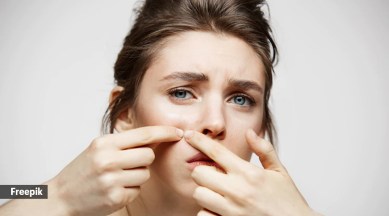📣 For more lifestyle news, click here to join our WhatsApp Channel and also follow us on Instagram
Five acne myths you should stop believing
Through an Instagram post, Dr Veenu Jindal, an aesthetic and medical dermatologist wrote, "Acne is the most common skin disorder affecting 8 out of 10 people sometime or the other in their lifetimes. It affects a wide range of age groups, beginning right at puberty up to even 60 years of age."

Whether you have had the occasional pimple or experience major breakouts, you’ve probably wondered what you can do stop those red painful bumps from popping up. However, you might have resorted to the internet to find solutions to heal your acne, many of the suggestions are not backed by evidence.
Highlighting the same through an Instagram post, Dr Veenu Jindal, an aesthetic and medical dermatologist wrote, “Acne is the most common skin disorder affecting 8 out of 10 people sometime or the other in their lifetimes. It affects a wide range of age groups, beginning right at puberty up to even 60 years of age,” adding that despite its commonality, there’s still a large amount of misunderstanding surrounding acne.
Here are five acne myths you should stop believing:
Myth #1 Acne is a disease of teenagers
Not really! Adults get acne too. Some adults continue to get acne well into their 30s, 40s and even 50s. It is even possible to get acne for the first time as an adult and is called “adult-onset acne.” Women tend to get adult acne more often than men do.
Adding to this, Dr Mandeep Singh, Head of Department, Plastic Surgery, Paras Health, Gurugram said, “There are many factors that can contribute to adult acne, including hormonal changes, stress, diet, and certain medications.”
Myth #2 Lemon juice, garlic and toothpaste can dry the pimples easily
Applying these can cause irritation and rashes, thereby developing an oozing, agonising injury that will leave behind a mark after healing. Toothpaste may contain baking soda that can dry out a periodic pimple. But, your issues could deteriorate if your skin is delicate/ sensitive. By drying out the skin, toothpaste can develop redness and peeling behind ugly blemishes.
Dr Singh said, “It is important to be cautious when trying home remedies for acne and to consult with a dermatologist before using any new treatments,” adding that there are many effective treatments available for acne, including topical and oral medications, that have been scientifically proven to be safe and effective.”
Myth #3 Acne will clear more quickly if you scrub your skin clean
Acne cannot be scrubbed away. Scrubbing will actually worsen acne. Instead, try this:
*Wash your face gently twice a day with a mild, fragrance-free cleanser.
*Use your fingertips to gently apply the cleanser.
*Rinse off the cleanser with warm–not hot–water, using your hands.
Additionally, Dr Singh noted that gentle exfoliation can be helpful for removing dead skin cells and unclogging pores, which can help to prevent acne. However, this should be done with a gentle exfoliant, and not with harsh scrubs or tools. “It is also important to avoid over-exfoliating, as this can lead to further irritation and sensitivity,” he said.
Myth #4 Blackheads appear when your pores get clogged with dirt
The dirt on the skin has nothing to do with acne. However, a dirty face can cause bacteria to enter the existing acne and give rise to larger boils. It is advised to keep your face clean by washing it twice daily.
Myth #5 Squeezing and popping spots will get rid of acne quickly
Popping a zit is oddly satisfying. But popping your acne can actually make it more noticeable by getting it infected, red, and inflamed. Squeezing your acne can also cause permanent acne scars.
Similarly, Dr Singh said, “Squeezing or popping a zit can cause the bacteria and pus to be pushed deeper into the skin, leading to further inflammation and potentially causing the formation of new blemishes. It can cause damage to the skin as well, leading to scarring or hyperpigmentation.”
Concluding, he recommends speaking with a dermatologist who can recommend the best treatment plan for your individual needs.
📣 For more lifestyle news, follow us on Instagram | Twitter | Facebook and don’t miss out on the latest updates!
📣 For more lifestyle news, click here to join our WhatsApp Channel and also follow us on Instagram